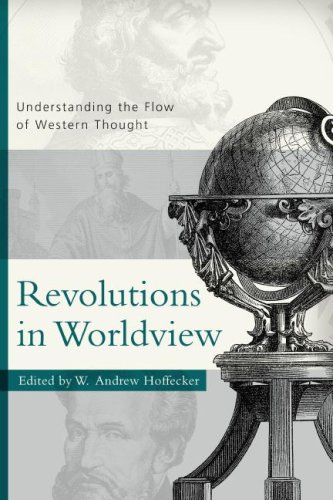A Brief Book Summary from Books At a Glance
Introduction
This book covers the story of Western thought from the Presocratics to the end of the 20th Century. It compares the biblical worldview with the worldviews and philosophies that have come and gone throughout history. In ten chapters, the major thinkers and developments of each era are examined, and a narrative thread is pulled through which shows the continuity and discontinuity in Western thought over the centuries. Thinkers and philosophical movements are evaluated on the basis of the presupposition that the Christian worldview is true.
Table of Contents
Chapter 1 Greeks Bearing Gifts (John Frame)
Chapter 2 The Hebrew World-and-Life View (John D. Currid)
Chapter 3 New Testament Worldview (Vern Sheridan Poythress)
Chapter 4 Christianity from the Early Fathers to Charlemagne (Richard C. Gamble)
Chapter 5 Medieval Theology and the Roots of Modernity (Peter J. Leithart)
Chapter 6 The Renaissance (Carl Trueman)
Chapter 7 The Reformation as a Revolution in Worldview (Scott Amos)
Chapter 8 Enlightenments and Awakenings: The Beginning of Modern Culture Wars (W. Andrew Hoffecker)
Chapter 9 The Age of Intellectual Iconoclasm: The Nineteenth-Century Revolt against Theism (Richard Lints)
Chapter 10 Philosophy Among the Ruins: The Twentieth-Century and Beyond (Michael W. Payne)
Summary
Chapter 1: Greeks Bearing Gifts
The contributions of Greek culture and thought are enormous, but we must not adopt their worldviews or synthesize them with the Bible. Although they knew God (Rom. 1), the Greek philosophers rejected him and constructed systems to make sense of the world without him. The nous, the unmoved mover, the logos—these were all conceptions that were infinitely short of who God is. Greek philosophy did not recognize a supreme, personal, absolute God. Philosophy began as a movement away from old religions and myths. Thales and other early philosophers tried to understand the natural order (what it was, where it came from, how it worked). Different pre-Socratic philosophers posited different ways of understanding the world that privileged either experience or rationality. There was an oscillation between rationality and irrationality, and every system had internal inconsistencies. Presocratic philosophy led to the Sophists, who were relativists. Socrates introduced the dialectic method and introspection to find truth. Plato is one of the most important philosophers in world history. He privileged reason over sense experience and posited the world of the Forms to explain knowledge. The highest form is the Good, and everything participates in it to some extent. Plato’s epistemology and metaphysics were practically applied in his political writings. He believed that both a city and an individual person should be properly controlled and internally balanced. Aristotle rejected Plato’s theory of the Forms. For metaphysics he held that substances consisted of both form and matter. Everything except the unmoved mover had both potentiality and actuality (i.e. potential for change from what something actually is currently, like an acorn growing into an oak). In Ethics, Aristotle taught that everyone pursues well-being. People should try to grow in virtue, and virtue is found in the golden mean between two vices of excess. Stoics were fatalists who sought to live according to natural laws and fate. Plotinus was the founder of Neo-Platonism, which held that the highest reality was the One (of which nothing could be predicated), and that a series of emanations came out of it which were abodes of life. The material world was far down the chain from the One; the Nous was closest to the One, and it was in the Nous that Plotinus located the Forms. All the Greek philosophers tried to interpret the world through their autonomous reason, and as a result they failed. We must understand the world in reference to God and his revelation.
Chapter 2: The Hebrew World-and-Life View
Many scholars have mocked the Hebrews as backwards and without a philosophy, but there is an incredible depth in their world-and-life view. The foundation for them was the existence of God and his revelation. God revealed himself in creation and historical acts, but also verbally. The Scriptures were considered infallible and authoritative since they were ultimately the very word of God. Hebrews were radically monotheistic in their beliefs. Their God was the only living God, the maker and ruler of all things. God revealed his nature and power through a variety of names, including Yahweh and various El-forms. The Hebrew Scriptures began with God creating the world. He was self-existent and everything that exists was made by his will and is dependent on him. Importantly, God created all things through the power of his word. Although evangelical scholars continue to debate how to interpret the details and structure of Genesis 1, and whether the world is young or old, the main points that God is the creator and that creation was ex nihilo should be agreed upon by all. Human beings were. . .
[To continue reading this summary, please see below....]The remainder of this article is premium content. Become a member to continue reading.
Already have an account? Sign In
Buy the books

Revolutions in Worldview: Understanding the Flow of Western Thought